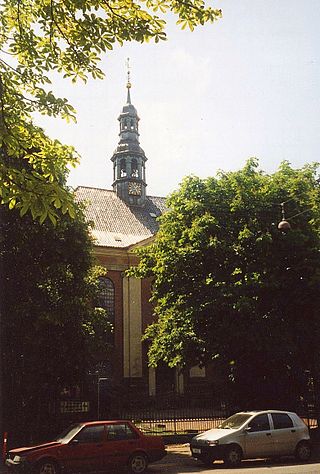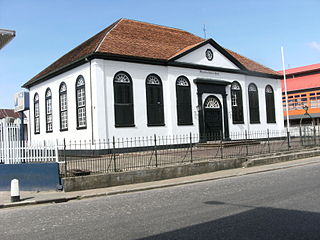
The Grote Kerk or St.-Bavokerk is a Reformed Protestant church and former Catholic cathedral located on the central market square in the Dutch city of Haarlem. Another Haarlem church called the Cathedral of Saint Bavo now serves as the main cathedral for the Roman Catholic Diocese of Haarlem-Amsterdam.

Den Hoorn is a village in the Dutch province of North Holland. It is a part of the municipality of Texel, and lies about 9 km north of Den Helder.

Nibbixwoud is a village in the Dutch province of North Holland. It is a part of the municipality of Medemblik, and lies about 5 km north of Hoorn.

The Oude Kerk is Amsterdam's oldest building and newest art institute. The building was founded about 1213 and consecrated in 1306 by the bishop of Utrecht with Saint Nicolas as its patron saint. After the Reformation in 1578, it became a Calvinist church, which it remains today. It stands in De Wallen, now Amsterdam's main red-light district. The square surrounding the church is the Oudekerksplein.
Johann Heinrich Hartmann Bätz was a Dutch organ builder.

De Duif is a church on the Prinsengracht in Amsterdam. At present – after the recent restoration by Stadsherstel Amsterdam – it is rented out for all kinds of events.

The Noorderkerk is a 17th-century Protestant church in Amsterdam, The Netherlands. The Noorderkerk is located along Prinsengracht canal, on Noordermarkt square. The church is used for Dutch Reformed Church services and is also used regularly for classical music concerts.

The Oosterkerk is a 17th-Century Dutch Reformed church in Amsterdam, The Netherlands.

Nieuwezijds Kapel, or Heilige Stede or Chapel of the Heilige Stede refers to a site in Amsterdam that includes shops and a Dutch Reformed church built in 1908 on the site of a church once called the Heilige Stede, originally built in the 15th century to replace a chapel that burned in a city fire of 1452. That original chapel had been built in 1347 as a result of the miracle of Amsterdam, located on the Kalverstraat where this miracle with the eucharistic host occurred.

The Kloosterkerk is a church on the Lange Voorhout in The Hague, Netherlands. The church and its accompanying monastery were first built in 1397. The church is known today as the church where Beatrix of the Netherlands occasionally attended services.

The Oost-Indisch Huis is an early 17th-century building in the centre of Amsterdam. It was the headquarters of the Amsterdam chamber of the Dutch East India Company. It is a listed Dutch national heritage site (rijksmonument).

The Nieuwe Kerk is a Dutch Baroque Protestant church in The Hague, located across from the modern city hall on the Spui. It was built in 1649 after the Great Church had become too small. Construction was completed in 1656.

The Lutherse kerk in Haarlem is a Lutheran church dating from the 17th century on the Witte Herenstraat in Haarlem, Netherlands.

Grote or Sint-Laurenskerk is a landmark formerly Protestant church in Alkmaar, Netherlands, now in secular use. The building is located on the Koorstraat. It is mostly closed in the winter and open for tourists in the summer months or by appointment.

Reformed Church in Gothersgade, opposite Rosenborg Castle, is a church building used by the reformed congregations in Copenhagen, Denmark. Consecrated in 1689, the church was instigated by Queen Charlotte Amalie, consort of King Christian V, who was herself a German Calvinist. The church is noted for its fine Baroque interiors which date from 1730 when it was restored after being damaged in the Copenhagen Fire of 1728.

The Ronde Lutherse Kerk or Koepelkerk is a former Lutheran church in Amsterdam, Netherlands, on the Singel canal. The church can be easily seen from the Singel, identified by its copper dome.

The Walloon Church is a Protestant church building in Amsterdam, along the southern stretch of the Oudezijds Achterburgwal canal. The building dates to the late 15th century and has been in use as a Walloon church since 1586. The church was also known as the Franse Kerk, Walenkerk, Oude Walenkerk, or Oude Waalse Kerk.

The Evangelical Lutheran Church on the Breedstraat 40, Enkhuizen, is a former church of the Evangelical Lutheran Church in the Kingdom of the Netherlands. The congregation was founded in 1623 by the family of a Danish Lutheran merchant, Frederik Dirxen van Tatinghof, who had come to Enkhuizen for the trade in oxen, and was severely suppressed until 1641, when the congregation was allowed to gather in a building acquired by one of Tatinghof's sons. When the congregation shrank in the 1800s, it acquired the building at the Breedstraat and dedicated it in 1843. In 2017 it moved to another building in the city. The church on Breedstraat 40, the parsonage on no. 42, and the sacristy on no. 44 are Rijksmonuments.

The Dutch Reformed Church of Zwartsluis is a historic Dutch Reformed church building located on the Kerkstraat in Zwartsluis, Netherlands.

The Martin Luther Church is a church of the Evangelical Lutheran Church in Suriname. It is located on Waterkant in the historic centre of Paramaribo, Suriname. The building is a monument. The first church burnt down in 1832. The current church dates from 1834.



















